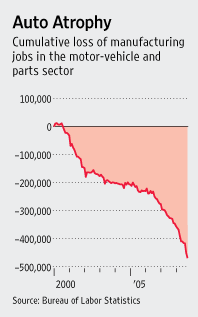Yet More Economic Ignorance
Don Boudreax shares this leftish view of the auto bailout from Pat Garofalo:
More importantly though - as Pelosi and Reid said - "federal aid should come with 'strong conditions,' such as requirements that car makers build more fuel-efficient vehicles." Bill Scher at OurFuture writes, "With the auto industry in dire straits, we taxpayers have maximum leverage to demand the cars necessary to help lower energy costs, cut carbon emissions and reduce our dependency on foreign oil."
So, uh, only when the government gets involved do consumers have any leverage with producers in terms of what products they produce? Hello? I'm sure Circuit City execs will be relieved to hear this.
In free markets, consumers have all the leverage in determining perhaps not what gets produced, but at least what gets sold in any marketplace. Producers who are unable to match what they produce to what consumers buy eventually go bankrupt. In fact, it is this process of consumers exercising their leverage with GM that Congress is attempting to interrupt with a bailout. Consumers are telling GM loud and clear that GM is not making the cars at the price points they want. Unable to do so, GM will likely fail. This failure will result either in 1) GM, under bankruptcy protection, shedding any number of constraints that are preventing it from making what the consumers want or 2) GM liquidating its production assets to other owner/management groups who can do a better job with them.
This quote is a great example of the technocratic bent many leading Democrats bring to economics. What these guys are asking for is not leverage for consumers, but leverage for a few Democratic technocrats to makeover the auto industry the way they want it. People like Nancy Pelosi who would never in a million years be given the keys to a manufacturing corporation by a sane ownership group can effectively grab that jobs via the leverage her seat in Congress gives her.
Postscript: Garofalo adds:
and if you think about the ripple effects, they are the backbone of our manufacturing economy." Indeed, according to estimates, one in 12 U.S. jobs is tied to car manufacturing, and a bailout of the industry could help boost the U.S.'s ailing manufacturing sector.
A couple of points. First, a GM bankruptcy is hugely, enormously unlikely to mean the whole company is just shut down. If you have flown in the last 10 years, unless you have favored only Southwest Airlines, you probably have traveled on a carrier in chapter 11. That's what chapter 11 is - a breathing space while the company continues to operate but is able to restructure its liabilities. Personally, I would love to see the company go chapter 7 and have a new wave of innovative people take over the assets and see what they could do with them. But it is not going to happen. GM may shed jobs over the next year, but they are going to do so anyway in the teeth of a recession, not because they went bankrupt.
Podesta must know that the issue in a bankruptcy will not be jobs, but labor contracts (airlines have practically patented the chapter 11 vehicle for renegotiating union contracts). Most GM manufacturing employees would probably keep their jobs through a bankruptcy, but they may well lose their contract that says they get paid $75.86 an hour with 34.5 days a year of paid leave. Garofalo and Podesta are shilling for the union over wage bargaining, not jobs.
The other observation I want to make is to ask why the loss of these 250,000 jobs is going to be so much worse than the loss of 500,000 jobs over the last several years.

I know parts of Michigan suffered, but Podesta is claiming knock-on effects for the whole country. So where were they?